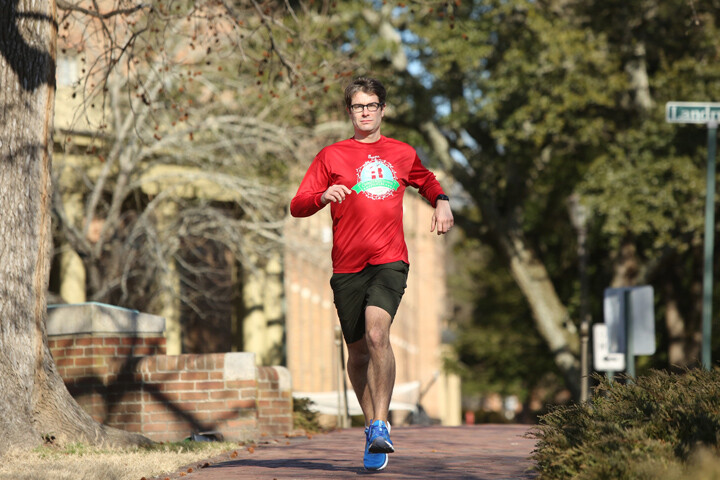What was once an activity for Marcus Holmes to stay in shape as a college student has turned into a full-blown passion that recently earned the William & Mary professor a distinction shared by Hollywood movie star George Clooney, among other big name entertainers. And he is using this newfound-celebrity to promote his work in diplomacy research and as a part of popular social justice campaign called “Make Humanity Great Again.”
Holmes is an avid runner, logging in the neighborhood of 10 miles a day, and he has been using the Zwift platform to improve his marathon time and connect with other runners. Holmes runs so much on Zwift that he has recorded the most running miles of anyone on the platform Ñ 8107.7 as of earlier this year.
This Zwift connection put him in touch with British comedian/actor Eddie Izzard to discuss international diplomacy during a recent virtual marathon. It seems that Izzard herself ran a series of virtual marathons for a campaign called “Make Humanity Great Again” and invited many people to join as guests during her runs, including such notable entertainers as Clooney, Stanley Tucci and comedian and podcast host Joe Rogan.
“Hey, I was a guest just like Clooney,” Holmes says. “Of course I’m not comparing myself to these people, but I just think it’s kind of fun that I was involved in something some pretty famous people took part in also.”
During their mid-January conversation, Holmes sat in front of a Zoom background of the school’s Wren Building and Izzard ran on a treadmill. They spoke for nearly a half-hour about topics ranging from Holmes’ work at William & Mary to his research on diplomacy.
“We were talking about running and my academic work and that dovetailed with her interests, so it all came together in a nice way that I really wasn’t expecting. It was fun,” says Holmes.
During the “Make Humanity Great Again” campaign, Izzard ran 32 marathons on a treadmill in 31 days to raise money for charity.
Those tuning into Holmes’ conversation with Izzard heard about the research Holmes is doing on diplomacy for a book he is writing with Nicholas J. Wheeler, a professor at University of Birmingham in the United Kingdom. The book will explain how some world leaders are able to build bonds of trust through face-to-face interactions, while others fail to do so.
Holmes started running competitively after college. That’s when he ran the first of his 17 marathons, including Boston, Chicago and New York.
He started using Zwift in June of 2018 in preparation for another marathon. He set a goal to run a sub-three-hour marathon and the online program, which includes a mobile application to chart progress and chat with other runners, helped him accomplish that. He ran a 2:59.09 in that race and has since bested that mark with a 2:56.48.
Holmes estimates he runs 10 to 12 miles a day on the treadmill in his basement. All those miles add up quickly, which is why he was able to rack up such a large number on Zwift. He has become semi-famous for his mile total and for his time in the spotlight with Izzard.
“I started using Zwift to sort of keep my mind off of something that normally is really boring and sort of difficult to do,” Holmes says. “And it turned out to be this large international community that I had no idea even existed that now I’m a part of and kind of famous on it, too.”
Holmes has connected with runners in Singapore, London and Brussels. What was once mostly idle chitchat has morphed into conversations about Holmes’ work. Zwift allows for actual conversations via headsets through an add-on, but Holmes sticks to texting on his old-school Blackberry phone and its QWERTY keyboard.
“I know it sounds tricky to run and type, but it’s actually not that bad. You kind of get used to it,” Holmes said.
Holmes started running marathons shortly after college to challenge himself. He moved up to ultra-marathons after that and now has a goal of running 100 uninterrupted miles on the treadmill.
“One hundred miles is attractive to me because it’s going to be so physically horrendous,” Holmes says. “I’m not sure if I have a masochistic streak or something, but I’m just attracted to these really difficult and challenging physical endeavors.
This article was written by Nathan Warters and originally appeared on wm.edu and is excerpted with permission.






